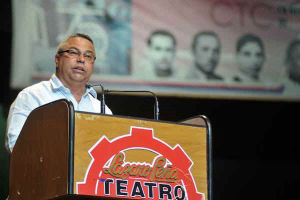
http://www.trabajadores.cu
HAVANA, Cuba. The 20th Congress of the ruling Cuba Workers Central (CTC) has just concluded its sessions. Even though authorities proclaimed that this had been a democratic meeting, what is true of every workplace discussion of the main documents is that very few workers expected anything good from the event. I could verify the foregoing a day after the conclusion in conversations held with several people.
Alina is a worker in a dressmaking shop of the Ministry of Industries. She told me that she did not bother to read newspapers or watch television news during the days that the Congress was in session. Overall, it was not going to answer her demand and that of the rest of her companions: a salary increase.
Alina told me that in her workshop three systems of payment have been applied, and none of them has served any purpose. They have not been able to pay the wage stimulus because the company to which the workshop is subordinate has breached the indicators that they call macroeconomics, and no worker understands where they come from.
The day that they gave the pre-Congress meeting in her workshop, her companions suggested that, since they never paid the stimulus, at least they could increase the base salary. But the municipal CTC official said that was impossible until the country’s labor production and productivity increased. “And of course I wasn’t about to listen to the same story now in the 20th Congress,” concluded Alina.
Miguel Angel is a Bachelor in Economics. He does not much like that kind of slogan that the government brandishes in the context of modernizing the economic model, in the sense that planning prevails over the market. What he likes least is that the CTC is not original and merely repeats what the country’s rulers say.
Like many, he was not aware of what happened in the chief worker meeting. He did not need to be. Some days before, Mr. Ulises Guilarte de Nacimiento, who presided over the Organizing Commission for the 20th Congress, confirmed that the unions supported the economic strategy that planning put in the foreground. “Well,” says Miguel Angel, “I oppose planning in Cuba. The government planners here, besides being inefficient in their work, want to stick their noses into everything, even in what must be produced and sold in a simple farmer’s market.”
And on passing near one area where some months before everything was business due to the clothes that private workers were marketing and that today languishes in loneliness, I stumbled on Yoandri, a young man who had to turn in his license as a self-employed worker. He was one of the first to agree to belong to the unions sponsored by the CTC. Today, however, he assesses that decision as useless. “Bottom line, it was all for nothing. When they closed my clothing business, the union did nothing to defend me,” he confessed.
He also said that his case could serve as a lesson to many other self-employed workers who find themselves pressured by authorities to join the unions. “The government wants to unionize them in order to control them better, because here the union and the government are the same thing. The rest is baloney,” he concluded.
Ah, and the three knew beforehand that the fatso by the name of Brazilian — as they call Ulises Guilarte de Nacimiento — was going to be elected secretary general of the CTC. That was decided previously.
Cubanet, February 26, 2014, Orlando Freire Santana
Translated by mlk
